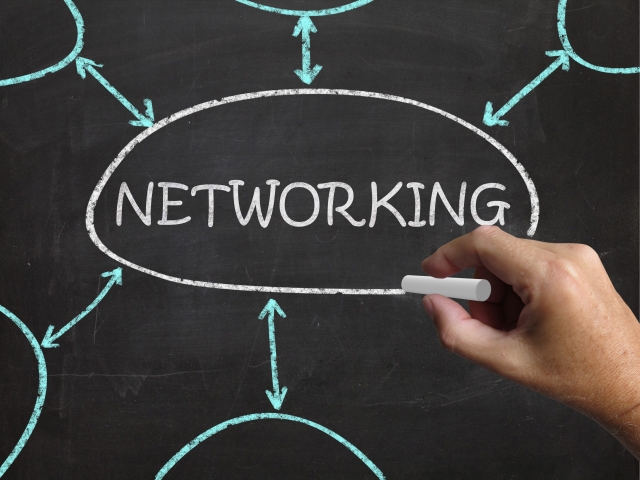
How to Overcome Networking Anxiety
We all know that to find a better job or pursue a business idea we have to network. But why do most of us (especially introverts like me) cringe at the thought of attending a networking event?
It’s not because we don’t know how to network. Tons of advice about successful networking is only a Google search away, and most everyone I’ve interviewed knows the basics. Often the real challenge is simply having the courage to walk up and introduce ourselves to people we don’t know.
A few years ago Columbia University professors Paul Ingram and Michael Morris demonstrated this in a clever experiment. They organized a networking event for executives. Over 95 percent of the attendees said that their goal was to meet new people. Prior to the event they asked each person to examine the attendee list and identify who they knew. When the executives arrived to network, they gave them a special badge that allowed the researchers to track who talked to who.
They found that despite their best intentions, most of the executives spent the majority of their time talking to people they already knew, and only met new people if they had an acquaintance in common. Their advice for networkers – don’t bring your friends along [1].
Through my interviews I’ve found that our reluctance to network tends to come from one (or more) of four basic networking anxieties:
- Intrusion anxiety – we don’t want to interrupt and bother busy people or those already engaged in conversation
- Impression anxiety – we’re worry about making a good first impression
- Performance anxiety – we fear making stumbles during the networking conversation that make us look bad
- Rejection anxiety – we don’t want to hear “no” or “we’ll see” and what we believe that signifies about our networking abilities and potential value to an organization
Even though many people find that the vast majority of their networking conversations go reasonably well, they notice that it doesn’t seem to reduce their reluctance to introduce themselves the next time. Why?
Part of the reason is that for most of human history there was an evolutionary advantage to be wary of strangers. We used to live in small hunter-gatherer groups and rarely met people we didn’t know. When we did it often meant others were encroaching on our territory (or vice versa). Furthermore, getting rejected from our group and pushed out into the wilderness alone was practically a death sentence, so we also evolved to have a natural, instinctive fear of social rejection, even in social situations (like networking) where the real impact of any individual rejection is extremely small.
Put another way, for most of human history there was almost never an opportunity or need to be good at introducing ourselves to dozens of complete strangers, so we’ve never evolved to be good at it. We’re also rarely taught to do it well in school or beyond. Unfortunately, our reluctance to introduce ourselves can keep us from networking, and without practice we don’t get better at it.
My general advice for becoming more comfortable and confident at networking events is the following:
- Recognize that most everyone at the networking event probably feels a little awkward and nervous too. Take the advice of one newcomer I interviewed who said “I assume that everyone else is as uncomfortable as I am, and it’s my duty to make them more comfortable, which helps me forget that I’m uncomfortable
- Put yourself in the other person’s shoes. If the roles were reversed and you were being approached, how would you feel? Would you be annoyed or would you welcome the interaction and conversation? If you’d be comfortable, then assume they’d be comfortable too and go for it
- If you want to make a good first impression, be friendly, humble, and a good listener. If it’s a potentially a critical connection, let them drive the conversation, but look for opportunities to talk a little bit about yourself and your goals.
- See it as a numbers game. It’s inevitable you’ll have some awkward or flat conversations. The significance of those conversations drops exponentially as you push past them and network with more people.
You’ll find it easier to network if you approach it as an opportunity to learn new things about other people, instead of seeing it as a litmus test of your interpersonal skills.
Ultimately, a little anxiety at networking events is probably good, as it keeps you focused and alert. But too much can either turn networking events into a stressful, energy-draining experience or even worse cause you to avoid them altogether. Understand your anxiety, accept it, find and make eye contact with a friendly face, and go introduce yourself.
Endnotes
[1] Ingram, P., & Morris, M. W. (2007). Do People Mix at Mixers? Structure, Homophily, and the “Life of the Party”. Administrative Science Quarterly, 52(4), 558-585.This was originally posted on my LinkedIn page on July 31, 2015. Click here for original post.




Keith:
There is excellent survey data about the percent of U.S. adults and adolescents who have performance and interaction fears that arise in networking situations. (The article about U.S. adults lists both fears and phobias, as does another article pooling data from developed and developing countries).
See my November 13, 2013 blog post – How many Americans are scared of networking situations? An infographic showing both fears and phobias for meeting new people and talking with strangers:
http://joyfulpublicspeaking.blogspot.com/2013/11/how-many-american-are-scared-of.html
Also see my August 20, 2014 blog post – Having to give an elevator speech is the most commonly feared networking situation:
http://joyfulpublicspeaking.blogspot.com/2014/08/having-to-give-elevator-speech-is-most.html
Richard